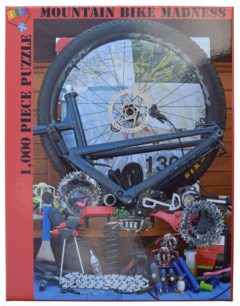Introduction
In today’s fast-paced world dominated by technology and instant gratification, it’s important to find activities that can stimulate our minds and provide a much-needed break from screens. One such activity that has stood the test of time is jigsaw puzzles. While jigsaw puzzles are available in various levels of difficulty, it’s the challenging ones that truly shine when it comes to engaging our cognitive abilities. In this blog post, we will explore the benefits of difficult jigsaw puzzles and how they help stimulate and sharpen our minds.
Mental Workout: Challenging the Brain
Difficult jigsaw puzzles serve as an excellent mental workout for our brains. As we attempt to solve them, our minds are pushed to think critically, analyze patterns, and engage in problem-solving. Each piece presents a unique challenge, requiring us to use our spatial awareness and visual perception skills to determine its correct placement.
These puzzles demand our full attention and concentration, encouraging us to focus and develop our attention to detail. By engaging in this mental exercise, we strengthen neural connections, improving our cognitive functions such as memory, attention span, and logical reasoning.
Enhancing Problem-Solving Skills
Solving difficult jigsaw puzzles requires a systematic approach and strategic thinking. We must first sort the pieces, identifying edges and patterns, before gradually connecting them to form larger sections. This process trains our brains to think critically, break down complex problems into smaller, manageable parts, and devise effective strategies to solve them.
As we tackle challenging puzzles, we develop patience and perseverance, learning to embrace the trial-and-error process. The satisfaction of eventually fitting the pieces together teaches us resilience and the value of persistence, skills that translate into various aspects of our lives.
Boosting Visual-Spatial Skills
One of the primary benefits of difficult jigsaw puzzles lies in their ability to enhance visual-spatial skills. These puzzles require us to mentally rotate and manipulate pieces, analyzing their shapes and colors to determine their correct placement. This process improves our visual perception, depth perception, and spatial reasoning abilities.
Repeated exposure to challenging puzzles strengthens our brain’s ability to mentally visualize and manipulate objects in space. This skill is transferable to real-life situations, such as navigating through unfamiliar environments or mentally visualizing complex concepts.
Stress Relief and Relaxation
Engaging in a difficult jigsaw puzzle provides a welcome break from the stress and demands of everyday life. The focused attention required to solve these puzzles helps quiet the mind, promoting relaxation and mindfulness. As we immerse ourselves in the puzzle-solving process, we can experience a sense of calm and escape from the pressures of the outside world.
Completing a challenging puzzle also releases endorphins, the brain’s natural feel-good chemicals, which contribute to a sense of accomplishment and happiness. This positive emotional response further reduces stress levels and enhances our overall well-being.
Social Engagement and Collaboration
Difficult jigsaw puzzles can also be a great way to foster social engagement and collaboration. Working on a challenging puzzle with family members, friends, or colleagues promotes teamwork, communication, and problem-solving skills. Each person brings their unique perspective and strengths to the table, contributing to the shared goal of completing the puzzle.
Moreover, the process of solving a challenging puzzle together creates an environment of camaraderie and bonding. It encourages conversation, laughter, and the sharing of ideas, fostering meaningful connections and strengthening relationships.
Conclusion
In a world increasingly dominated by digital distractions, it’s crucial to prioritize activities that provide mental stimulation and promote cognitive health. Difficult jigsaw puzzles offer a delightful escape from screens while offering numerous benefits for our minds. From enhancing problem-solving skills to boosting visual-spatial abilities, and providing stress relief and social engagement, these puzzles serve as a valuable tool for stimulating our minds and improving overall cognitive function. So, the next time you’re looking for a challenging and rewarding activity, grab a difficult jigsaw puzzle and unlock the potential of your mind.
Here is one of our favorite difficult puzzles from Parachute Puzzles.




